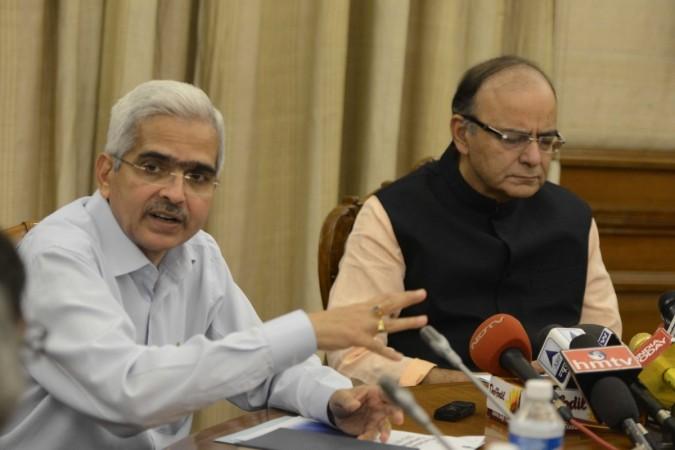
Declaring that he will uphold the "autonomy, integrity and credibility" of the RBI, newly-appointed Governor Shaktikanta Das said on Wednesday that the government is responsible for running the country and the central bank is also accountable.
Briefing reporters here after taking charge as the 25th Governor of the Reserve Bank of India (RBI), Das said that consultations with stakeholders have become fundamental to the central bank's functioning in view of the complexity of modern-day decision-making, and as part of this process he would meet the heads of the Mumbai-based state-run banks on Thursday.
Meetings with public sector banks outside Mumbai would follow "after some days", he added.
"The RBI is a great institution and I will try my best to uphold its autonomy, identity and values. The autonomy, integrity and credibility are very important for this great institution and it will remain intact," he assured.
In response to queries on the recent government-RBI tiff culminating in the resignation of Urjit Patel as Governor, Das refused to go into contentious issues.
"I do not like to go into whatever the issues or what are the issues between the government which runs the country and the RBI, but every institution has to have its professional integrity, maintain its professional autonomy. At the same time, every institution also must adhere to the principles of accountability," he said.
"Government is not just a stakeholder but I mean the government of the day runs the economy, runs the country and manages major policy decisions.
"There has to be a free, fair, objective and very frank discussion between the government and the RBI. And, I believe that all issues, however contentious, can be resolved through discussions," he added.
Das, who holds a post graduation degree in history from the Delhi University, unlike his predecessors Urjit Patel and Raghuram Rajan, who were economists of repute, said the RBI board meeting would be held on Friday (December 14) as scheduled.
"We will hold the central board meeting as planned on December 14 and go through the agenda and discuss the various issues that are listed," he said.
Das took charge as the RBI Governor a day after Urjit Patel resigned amidst a tiff with the Central government on the issue of RBI's autonomy. Das had steered the monetary situation post-demonetisation as the Economic Affairs Secretary.
On the issue of RBI's reserves, he said a committee to examine it would be constituted shortly and then with the appointment of its Chairman, the terms of reference of the committee would be drawn with fixed timelines.
Das said he does not want to discuss individual issues as he intends to settle down first and study the issues before taking any decision. On capital requirement in the economy, he said he is open to discussing all issues within the ambit of RBI.
"After the amendment of the RBI Act, the inflation targeting continues to be very important and it's very heartening to note that inflation broadly is as per the targets and inflation outlook also looks fairly benign at this stage, but we have to be very watchful of the developments," he said.
The health of public sector banks, liquidity issue and maintenance of growth trajectory of Indian economy are some of the important issues for which he would interact with stakeholders and get an internal feedback before taking a view on these, he said.
Unlike his immediate predecessor Patel, who the government officials alleged had little stakeholder consultations, Das said consultation with all stakeholders always adds value to understanding and his top priority is the banking sector.
"To begin with, I have convened a meeting with the MDs and CEOs of the public sector banks based in Mumbai tomorrow. Banking is an important segment of our economy and is currently facing several challenges which are of critical importance and they need to be dealt with."
He will follow it up with similar consultations with the state-run banks from outside Mumbai and still later with the chiefs of private sector banks to understand the issues relating to them.
"This is a general consultation. There is no fixed agenda," he said denying that RBI's Prompt Corrective Action (PCA) framework, a measure to check banks' financial health, would be discussed. Currently, 11 out of 21 public sector banks are barred from lending.
Looking forward to working with the officers and staff of the RBI, Das said he always found RBI officers possessing inherent core competence and professionalism to deal with any technical issue.
"I will work as a team with other officials here (RBI) in the best interest of the economy," he said. Das is a retired 1980-batch IAS officer from Tamil Nadu cadre.
Immediately prior to his current assignment, Das was acting as 15th Finance Commission member and G-20 Sherpa of India. In the last 38 years, Das held important positions in Central and state governments in areas of finance, taxation, industries and infrastructure.

















